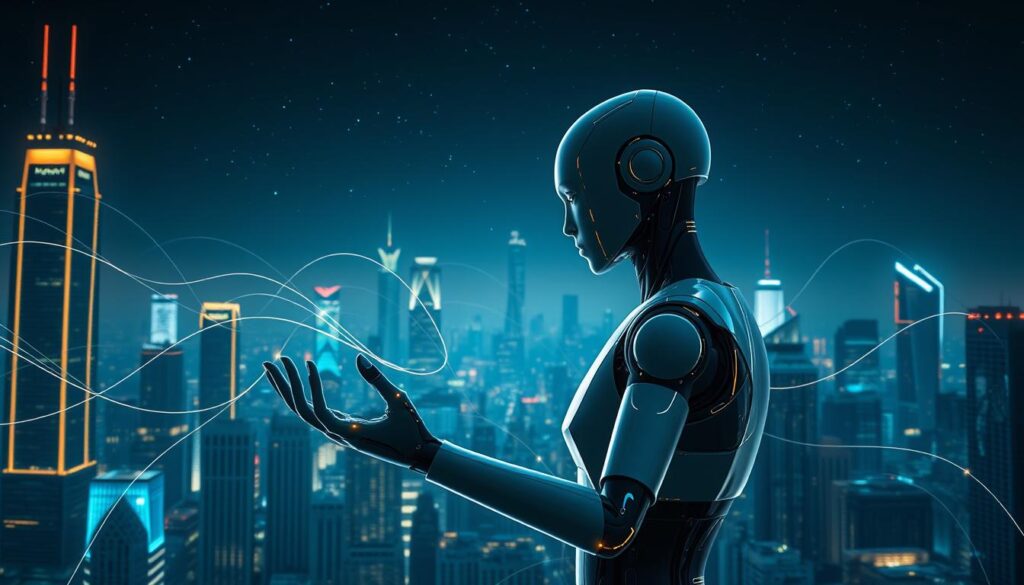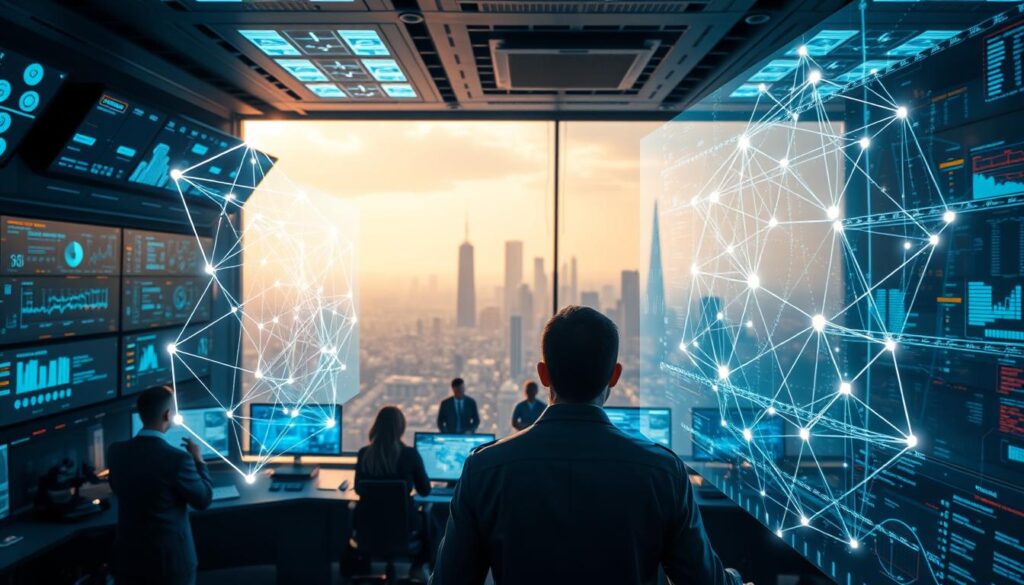The digital marketing world is changing fast. Artificial intelligence now shapes how content reaches audiences, creating heated debates about its role in search engine optimization. While some fear machines could replace human expertise, history shows SEO constantly evolves—it doesn’t disappear.
Remember when Google’s RankBrain shook the industry in 2015? Or how BERT in 2019 forced marketers to rethink keyword strategies? Each algorithm update sparked predictions about the “death of SEO,” yet professionals adapted. Today, tools like ChatGPT and Google’s MUM signal another shift—one where AI doesn’t erase SEO but reshapes it.
Traditional tactics like keyword stuffing no longer work. Modern search engines prioritize user intent and context, powered by machine learning. For example, Google’s Search Generative Experience (SGE) generates instant answers, blending AI with organic search results. This doesn’t eliminate SEO—it demands smarter strategies.
The question isn’t whether AI will dominate, but how experts can harness it. From automating data analysis to refining content quality, the future lies in collaboration between humans and machines. Let’s explore what this means for your strategy.
Key Takeaways
- SEO adapts to technological shifts instead of disappearing
- Google’s AI updates (RankBrain, BERT, MUM) transformed search behavior
- Modern strategies focus on user intent over keyword density
- Generative AI tools like ChatGPT complement—not replace—human expertise
- Success requires balancing automation with creative problem-solving
Introduction: Exploring the Future of AI and SEO
Picture a world where marketing teams brainstorm alongside algorithms. That’s today’s reality. Over 60% of businesses now use AI-powered tools for tasks like keyword research and competitor analysis, according to recent industry surveys. These innovations are reshaping how we approach content creation and search engine strategies.
Setting the Stage for AI’s Role in SEO
Platforms like ChatGPT and Google’s Bard have become collaborators, not replacements. They analyze data faster than any human, spotting trends in search behavior or suggesting topic clusters. But here’s the catch: they lack the intuition to craft stories that resonate emotionally.
Why the Debate on AI vs. Human Expertise Matters
Imagine asking a machine to write a heartfelt product review. It might nail the facts but miss the warmth of personal experience. That’s why 78% of marketers in a 2023 study agreed that blending automation with creativity yields the best results. Tools handle the heavy lifting—humans add the spark.
The key takeaway? AI elevates efficiency, but your unique perspective keeps audiences engaged. Let’s explore how this partnership shapes modern strategies.
Understanding Search Engines and SEO Basics
The journey from typing queries into clunky interfaces to getting instant answers began with tools few remember. Early systems like Archie (1990) crawled file names, not web pages. By the time Google launched in 1998, the focus shifted to ranking pages based on links and content quality.

What Is a Search Engine?
A search engine acts like a librarian for the internet. It scans billions of web pages, organizes them, and delivers results matching user questions. Modern versions like Bing use AI to understand context—like recognizing “best pizza near me” means local restaurant listings.
The Fundamentals of Modern SEO
Gone are the days of stuffing articles with repetitive keyword phrases. Google’s 2022 Helpful Content Update rewards content written for people, not algorithms. Strategies now prioritize answering questions thoroughly while following E-E-A-T principles (Expertise, Experience, Authoritativeness, Trustworthiness).
| Era | Focus | Method |
|---|---|---|
| 1990s | Keyword Matching | Meta tags & density |
| 2000s | Backlinks | PageRank algorithm |
| 2010s | User Intent | BERT language model |
| 2020s | Holistic Experience | AI + E-E-A-T guidelines |
Social media and video content now influence rankings too. Platforms like YouTube often appear in results for “how-to” searches. This shift demands diverse content formats alongside traditional text-based optimization.
The Evolution of SEO in a Changing Digital Landscape
Remember when optimizing websites meant stuffing articles with repetitive phrases? Those days vanished as search engines grew smarter. The shift from mechanical tactics to human-centered strategies reshaped digital marketing forever.
From Keywords and Backlinks to People-First Content
Early SEO focused on technical wins—exact-match domains and buying links. Google’s Panda (2011) and Penguin (2012) updates changed the game. Suddenly, thin content creation backfired, while detailed guides answering real questions thrived.
Algorithm Updates and the Advent of AI in Search
RankBrain (2015) introduced machine learning to interpret queries. BERT (2019) understood context like never before. Now, MUM and SGE generate instant answers but still rely on human-crafted search results for depth. Each update forced marketers to adapt—not abandon—their strategies.
| Update | Year | Impact |
|---|---|---|
| Panda | 2011 | Penalized low-quality content |
| Penguin | 2012 | Targeted spammy links |
| RankBrain | 2015 | Interpreted search intent |
| SGE | 2023 | Integrated AI-generated answers |
Lessons Learned from the “Death of SEO” Predictions
Every major algorithm change sparked doomsday headlines. Yet traffic analysis shows organic search drives 53% of website visits today. Tools changed, but the need to connect audiences with valuable data remains. Adaptation—not extinction—defines SEO’s story.
How AI is Transforming SEO Practices
The landscape of digital marketing is witnessing a quiet revolution—one where algorithms handle spreadsheets while humans focus on big-picture thinking. Tools like Surfer SEO now analyze thousands of pages in seconds, identifying gaps in strategies that once took weeks to spot manually.

Automation of Routine SEO Tasks
Imagine trimming hours from keyword research. Platforms like Clearscope use machine learning to suggest semantically related terms based on top-performing content. Metadata optimization, once a tedious chore, becomes effortless as AI generates title tags and descriptions aligned with user intent.
Take HubSpot’s Content Strategy Tool—it automates audits, flagging pages needing updates before rankings drop. This shift lets teams focus on creative problem-solving rather than repetitive tasks.
Enhancing Content Strategy with AI Tools
Advanced systems now predict behavioral shifts before they trend. ChatGPT helps draft outlines matching engines’ E-E-A-T guidelines, while Jasper refines tone for specific audiences. A travel blog increased organic traffic by 40% using AI to personalize city guides based on real-time search patterns.
These innovations don’t replace human insight—they amplify it. By blending data-driven suggestions with editorial expertise, brands craft content that resonates emotionally while satisfying algorithmic requirements.
will seo be taken over by ai: Debating the Future Impact
The tension between automation and human insight fuels heated discussions about digital strategies. Can machines truly replicate the nuanced decisions behind successful website optimization? Let’s unpack both sides.
Arguments for and against AI Dominance
Proponents highlight AI’s unmatched speed in processing data. Tools analyze backlink patterns and predict ranking shifts faster than manual research. A 2023 BrightEdge study found AI-powered platforms reduce keyword analysis time by 72%, freeing teams for strategic work.
Critics counter that creativity remains uniquely human. Machines struggle to craft metaphors that connect with readers or adapt humor for niche audiences. Google’s E-E-A-T guidelines prioritize firsthand experience—something algorithms can’t authentically replicate.
Consider the future of travel blogs. AI might generate accurate hotel lists but miss hidden gems locals share. Over-reliance on automation risks homogenized content, diminishing website differentiation.
Recent HubSpot data reveals 64% of marketers blend AI suggestions with editorial judgment. Backlinko’s analysis shows pages combining data-driven optimization with storytelling earn 3x more organic traffic. This synergy suggests coexistence, not replacement.
The path forward? Leverage AI for repetitive tasks like meta descriptions but keep human editors shaping narratives. As search evolves, balancing efficiency with emotional resonance will define winning strategies.
AI-Powered Algorithms and Search Engine Updates
Search engines now evolve like seasons—each update bringing smarter ways to match questions with answers. Behind these changes lie AI algorithms that learn from billions of interactions, reshaping how content gets discovered.

Google’s Evolution: RankBrain, BERT, MUM, and SGE
Google’s journey began with RankBrain in 2015. This machine learning system decoded ambiguous queries like “best apple recipes” (fruit vs. tech brand). BERT followed in 2019, analyzing sentence context to grasp nuances in phrases such as “parking on hills with versus without curbs.”
MUM (2021) took it further, understanding 75 languages simultaneously. It connects dots between topics—like suggesting hiking gear for a Patagonia trip based on weather data. Now, Search Generative Experience (SGE) generates instant summaries, blending AI answers with traditional search results.
“Our goal isn’t to replace websites but to help users find deeper insights faster.”
| Algorithm | Year | Key Feature |
|---|---|---|
| RankBrain | 2015 | Query interpretation |
| BERT | 2019 | Contextual understanding |
| MUM | 2021 | Multilingual analysis |
| SGE | 2023 | AI-generated summaries |
Bing Chat and OpenAI’s Contributions
Microsoft’s Bing Chat, powered by OpenAI, offers real-time conversations. Ask “Plan a weekend in Austin,” and it suggests music venues, taco spots, and hike trails—all sourced from live data. This strategy prioritizes immediacy over static links.
While Google focuses on accuracy, Bing leans into creativity. Their ChatGPT integration crafts poem-like answers for queries like “describe autumn in New England.” This rivalry pushes both platforms toward more intuitive, user-first experiences.
The need for adaptable creation grows clearer. As algorithms prioritize helpfulness, brands must balance data-driven keywords with authentic storytelling. The future? Search engines that feel less like librarians and more like travel guides.
AI-Driven Content Creation and Optimization Strategies
Imagine drafting a blog post that answers unasked questions—predicting what readers need before they type a query. Generative AI tools like ChatGPT and Google’s Bard make this possible, analyzing search patterns to craft content that anticipates user needs. These systems don’t just write—they strategize.
Leveraging Generative AI for High-Quality Content
Brands like TechCrunch use AI to generate first drafts in minutes, freeing writers to focus on adding unique insights. A 2023 HubSpot study found teams using these tools produce 35% more articles monthly without sacrificing quality. The secret? Machines handle data-heavy tasks like competitor analysis, while humans inject personality.
For example, Outdoor Gear Lab increased organic traffic by 40% after using AI to identify gaps in their hiking boot reviews. The tool flagged missing comparisons between waterproofing technologies—a detail human writers expanded into award-winning guides.
Optimizing Content for User Intent and Relevance
Modern algorithms prioritize content that solves problems, not just keywords. Tools like MarketMuse analyze top-ranking pages to suggest subtopics addressing specific user questions. This approach ensures articles cover every angle of “how to start urban gardening,” from soil pH to balcony space hacks.
“The best content doesn’t just rank—it becomes the go-to resource in its niche.”
| AI Optimization Method | Impact on Relevance |
|---|---|
| Semantic keyword clustering | +52% page views |
| User intent mapping | +68% time-on-page |
| Readability scoring | 3x social shares |
By blending machine-generated insights with editorial judgment, brands create content that ranks and resonates. The future belongs to teams using AI as a co-pilot—not an autopilot—in their creative journey.
Balancing Human Expertise with AI in Marketing
Marketing teams now blend data science with creative storytelling. While algorithms crunch numbers, strategists translate insights into campaigns that spark connections. This partnership reshapes how brands engage audiences—without losing the magic of human intuition.
The Importance of the Human Touch in SEO
AI tools excel at spotting keyword gaps and predicting trends. Yet they can’t replicate the understanding of cultural nuances that make content relatable. A travel company doubled conversions by letting writers reinterpret AI-suggested itineraries, adding personal anecdotes about hidden cafes in Rome.
Consider Nike’s recent campaign. Their tool identified rising interest in sustainable footwear. Human creatives then crafted stories highlighting athletes’ eco-journeys—resulting in a 27% engagement boost. Machines provide maps; people choose the destination.
Integrating AI Insights with Creative Strategy
Effective marketing merges algorithmic precision with emotional resonance. Spotify’s playlist curators, for instance, use AI data on listening habits but finalize selections based on mood and seasonal trends. This hybrid approach ensures playlists feel personal, not robotic.
“Our best campaigns start with AI-generated reports. But the final spark always comes from team brainstorming.”
Three ways to harmonize these elements:
- Use AI for audience segmentation, then craft tailored messages
- Let tools handle A/B testing while humans analyze emotional impact
- Combine predictive analytics with real-time cultural awareness
The future belongs to teams viewing AI as a paintbrush, not the artist. By grounding data in human understanding, brands build lasting relationships with their audience.
Future SEO Trends and Advanced AI Integration
Tomorrow’s search experience will feel more like a conversation than a query. Voice assistants and predictive search engine algorithms already shape how we find information. By 2025, 65% of interactions with Google Search may involve AI-generated summaries, according to industry analysts.
Predictions for an AI-First Search Landscape
Expect three major shifts:
- Results adapting to individual browsing history
- Real-time content updates based on breaking trends
- Multimedia answers blending video clips and text
Tools like Google’s MUM could analyze local events to suggest weekend plans before users ask. For example, searching “family activities” might trigger suggestions for nearby festivals detected through social media.
| Traditional Approach | Future Strategy |
|---|---|
| Keyword clusters | Semantic topic webs |
| Static meta descriptions | Dynamic snippet variations |
| Monthly content audits | Real-time optimization |
Crafting Future-Proof SEO Strategies
Focus on expertise over automation. Brands like Wirecutter succeed by pairing AI-driven user intent analysis with hands-on product testing. Their camera guide updates automatically when new models launch but keeps human-written pros and cons.
“Winning content answers questions people haven’t thought to ask yet.”
Three steps to stay ahead:
- Use AI to track emerging questions in forums
- Build content hubs around core topics
- Test interactive formats like calculators
Ethical and Strategic Considerations of AI in SEO
Trust sits at the core of every successful digital strategy. As brands adopt AI for keyword research and content creation, questions arise about authenticity. Can automated tools maintain the quality audiences expect while chasing rankings?
Maintaining Trustworthiness and Quality in Content
AI-generated articles often lack the depth of firsthand expertise. A travel site using automation might list popular restaurants but miss local secrets that build reader loyalty. Over-reliance on tools risks generic outputs—like product reviews repeating specs without real-world testing insights.
Consider a health blog that used AI for keyword research. Traffic spiked initially, but readers noticed factual gaps. Trust eroded, and bounce rates climbed 45%. Human editors later added medical certifications and personal stories, restoring credibility.
Addressing Risks and Monetization Challenges
Automation can disrupt revenue streams. Ad networks penalize sites with repetitive content, while affiliate partners demand genuine recommendations. Brands balancing AI efficiency with editorial oversight see 30% higher ad retention rates.
Social media amplifies these risks. Platforms like Instagram prioritize authentic stories over robotic captions. One fashion brand blended AI-generated hashtags with influencer testimonials, boosting engagement by 22%.
“AI drafts the blueprint, but humans build the house. Without craftsmanship, even perfect data feels hollow.”
| Risk | Mitigation Strategy |
|---|---|
| Generic content | Human-curated case studies |
| Brand trust erosion | Transparent AI disclosure |
| Revenue drops | Hybrid content audits |
Three ways to harmonize ethics and results:
- Use AI for keyword research, not final drafts
- Disclose automated tools in author bios
- Test content impact on user experience metrics
Conclusion
The dance between human creativity and machine precision defines modern search strategies. From RankBrain’s query interpretation to today’s generative engine algorithms, artificial intelligence reshapes how content connects with audiences—but never replaces the need for human insight.
Historical patterns prove optimization thrives through adaptation. Organic search still drives 53% of website visits, with hybrid approaches outperforming purely automated tactics. Tools excel at crunching data, while marketers excel at crafting stories that spark genuine connections.
Three principles will guide success:
- Use algorithms for repetitive tasks like keyword clustering
- Reserve human judgment for cultural nuance and brand voice
- Update strategies quarterly as engine algorithms evolve
A travel gear company’s recent 40% traffic boost demonstrates this balance. Their team used AI to identify missing product comparisons but relied on outdoor enthusiasts to test gear in real-world conditions.
The future belongs to those who treat artificial intelligence as a collaborator—not a competitor. By blending technical optimization with authentic storytelling, brands build lasting visibility in our ever-changing digital landscape.
